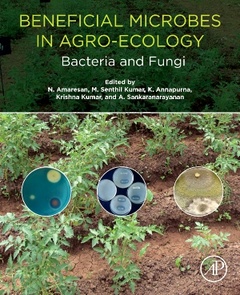Description
Beneficial Microbes in Agro-Ecology
Bacteria and Fungi
Coordinators: Amaresan N., Senthil Kumar M., Annapurna K., Kumar Krishna, Sankaranarayanan A.
Language: English
Subjects for Beneficial Microbes in Agro-Ecology:
932 p. · 19x23.3 cm · Paperback
Description
/li>Contents
/li>Readership
/li>Biography
/li>Comment
/li>
1. Arthrobacter 2. Alcaligenes 3. Serratia 4. Rhizobium 5. Streptomyces 6. Azospirillum 7. Bacillus 8. Pseudomonas 9. Brevibacillus 10. Exiguobacterium 11. Frankia 12. Kosakonia 13. Klebsiella 14. Enterobacter 15. Burkholderia 16. Lysobacter 17. Paenibacillus 18. Firmicutes 19. Azotobacter 20. Stenotrophomonas 21. Actinobacteria 22. Clostridium 23. Herbaspirillium 24. Methylobacterium 25. Cyanobacteria 26. Gluconobacter 27. Thiobacillus28. Glomus 29. Trichoderma 30. Metarhizium 31. Aspergillus 32. Ganoderma 33. Penicillium 34. Gliocladium 35. Pochonia 36. Duddingtonia 37. Paxillus 38. Pisolithus 39. Beauveria 40. Stropharia 41. Entamophora 42. Pythium 43. Paecilomyces 44. Dactylella 45. Hirsutella 46. Ampelomyces
Dr. M. Senthil Kumar is a Senior Scientist (Microbiology) at ICAR-Indian Institute of Pulses Research, Kanpur. He has fifteen years of research experience on different aspects of plant-microbe interactions including biological control of soybean diseases and microbial mediated abiotic stress management in pulses. He explored the diversity of endophytic bacteria from wild and cultivated soybean varieties for biological control of soybean charcoal rot disease. He purified anti-microbial peptides from endophytic bacteria. He has developed bioinoculants and microbial consortia for improving moisture-deficit stress tolerance of rainfed chickpea.
Dr. K. Annapurna is Head, Division of Microbiology, ICAR-Indian Agricultural Research
Institute, New Delhi-12, India. She has been a pioneer researcher in the field of molecular ecology of legume - Rhizobium symbiosis, Azospirillum, Plant growth promoting rhizobacteria (PGPR) and initiated work on soybean rhizobial genetic d
- Presents a comprehensive collection of agriculturally important bacteria and fungi
- Provides foundational knowledge of each core organism utilized in agro-ecology
- Identifies the genera of agriculturally important microorganisms




